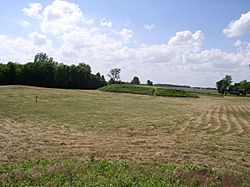Towosahgy State Historic Site facts for kids

Towosahgy Site main platform mound
|
|
| Alternative name | Beckwith's Fort Archeological Site |
|---|---|
| Location | Mississippi, Missouri, United States |
| Region | Missouri Bootheel |
| Coordinates | 36°41′36″N 89°14′08″W / 36.69333°N 89.23556°W |
| History | |
| Cultures | Mississippian culture |
| Architecture | |
| Architectural styles | platform mound |
| Architectural details | Number of monuments: 4 |
|
Beckwith's Fort Archeological Site
|
|
| Area | 116 acres (47 ha) |
| NRHP reference No. | 69000113 |
| Added to NRHP | July 29, 1969 |
| Towosahgy State Historic Site | |
|---|---|
| Elevation | 299 ft (91 m) |
| Established | 1967 |
| Governing body | Missouri Department of Natural Resources |
| Website | Towosahgy State Historic Site |
Towosahgy State Historic Site is an important archaeological site in Mississippi County, Missouri. It is also known as Beckwith's Fort Archeological Site. This place was once home to ancient people from the Mississippian culture. There are also signs of an even older group called the Woodland people (specifically the Baytown culture).
Scientists believe people lived here from about 400 AD to 1350 AD. Today, the Missouri Department of Natural Resources takes care of the site as a state historic site. The name Towosahgy comes from the Osage language. It means "old town." We don't know if the historic Osage people, who lived in this area later, ever lived at this specific site. Missouri's state park system bought the site in 1967. It was added to the National Register of Historic Places in 1969.
Contents
Discovering Towosahgy's Past
The oldest parts of Towosahgy State Historic Site are in the southern area. Here, archaeologists found traces of a Late Woodland period village. This village existed from about 400 to 700 AD.
The Mississippian Village
Later, the site became a larger Mississippian village. The people built seven large platform mounds. Most of these mounds were around a central open area called a plaza. The village was also protected by a strong palisade wall. This wall was made of tall, vertical logs. There was also a ditch, like a moat, around the village.
Just like other Mississippian mound centers, Towosahgy had a "borrow pit." This was a large hole where people dug up earth. They used this earth to build the big mounds. The biggest mound still standing is called Mound 2. It is also known as the "temple mound." In 1989, a scientist named James Price studied this part of the site.
Why Was Towosahgy Abandoned?
The people living at Towosahgy left the site in the late 1300s. We don't know exactly why they left. Many other similar Mississippian sites in the area were also abandoned around the same time.
Ancient Pottery at Towosahgy
Scientists have found many pieces of pottery at Towosahgy. These pieces are typical of the pottery made in the Missouri Bootheel region.
- Woodland Pottery: The older pottery from the Woodland period often used a material called "grog" mixed into the clay. Grog is crushed pottery or rock.
- Mississippian Pottery: The newer pottery from the Mississippian culture used crushed shells mixed into the clay.
Some common types of pottery found include Baytown Plain and Mulberry Creek Cordmarked. Mississippian pottery was both plain and decorated. Some pieces have patterns made by pressing fabric into the wet clay. Others have marks from being poked or cut. There are also pieces painted red, black, or brown. A large collection of these ancient pots from Towosahgy is on display. You can see them at the Beckwith Collection in the Rosemary Berkel and Harry L. Crisp II Museum at Southeast Missouri State University.
 | Victor J. Glover |
 | Yvonne Cagle |
 | Jeanette Epps |
 | Bernard A. Harris Jr. |


